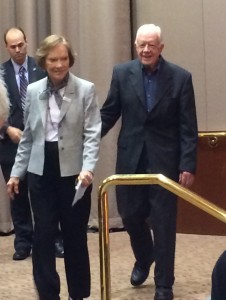Georgia’s only presidential center is located in a 35-acre park in the center of Poncey Highlands, approximately two and a half miles from Grady. The non-profit Carter Center was established in 1982 by former President Jimmy Carter and former First Lady Rosalynn Carter.
In addition to housing thousands of historical files, the organization improves health care in foreign nations, spreads democracy and promotes peace in more than 80 countries.
“Everywhere [President Carter] goes, he gets the highest amount of respect,” said Rita Thompson, the Carters’ personal assistant.
Through the Carter Center, President Carter remains an active voice in politics and global health issues. Because of the work of the Carter Center, President Carter was awarded the 2002 Nobel Peace Prize, 21 years after he left office.
On Sept. 16, the Carters held their annual “Conversations with the Carters” at the Carter Center to discuss the work they completed earlier this year as well as the center’s upcoming projects.
President Carter recently published “A Call to Action,” a book about the current status of women in the world. He began the program by highlighting the center’s plans to combat some of the atrocities international women face.
“Crimes against women are the most terrible deprivation that go on today,” Carter said in his introduction. Carter said he recently spoke with the Grand Imam in Egypt about efforts to eliminate crimes against women in the Middle East and Africa.
However, violence against women is also present in the United States. Carter explained that America’s university and military systems are the two most dangerous places for women in America.
According to a 2014 study conducted by the Carter Center, one out of five girls are sexually assaulted in their first four years of college. President Carter mentioned that the Pentagon received 5,061 reports of unwanted sexual contact in 2013, an increase of 50 percent from the previous year.
In addition to reducing violence and prejudice against women, the Carter Center has gained recognition for its dedication to ending global epidemics. President Carter stated that the center will treat 36 million people for diseases this year alone.
The Carter Center has partnered with the World Health Organization, the U.S. Centers for Disease Control and Prevention, UNICEF and other organizations to end some of the world’s most widely spread diseases.
Due to their efforts, Guinea worm, which ravaged 3.5 million people in the 1980s, will become only the second disease to be eradicated in human history. The center predicts that at least 80 million new cases of Guinea worm have been prevented due to the Carter Center sponsored Guinea worm eradication campaign.
Though Mrs. Carter is active in all aspects of the Carter Center, she prefers to focus on her quest to improve treatment and reduce discrimination against the mentally ill. Mrs. Carter has been an outspoken advocate for people suffering from these illnesses for 43 years.
Mrs. Carter believes that people often assume people with mental illnesses are violent or harmful. She said the general public is uninformed and unaware when it comes to the mentally ill.
“In reality, only 4 percent of all volatile crimes are committed by the mentally ill,” Mrs. Carter said during the presentation.
In order to combat the stigma of mental health, the Carter Center provides stipends to journalists from the United States, Romania and Colombia to report on mental health accurately. Mrs. Carter hopes this will influence the media around the world to do the same.
She also was influential in the passage of the Paul Wellstone and Pete Domenici Mental Health Parity and Addiction Equity Act of 2008, which ensures that the insurance coverage for mental illnesses is adequate for those affected.
Neither President nor Mrs. Carter show any indication of slowing down. The pair had just returned from a one and a half week trip to China. Mrs. Carter said she will be at home just one day in October.
“I don’t know how they do it,” Thompson said, “but it’s just how they are.”
President and Mrs. Carter ended the program by calling the Carter Center the best 30 years of their lives.
“Most of all we want to inspire self confidence and self respect,” President Carter said.








